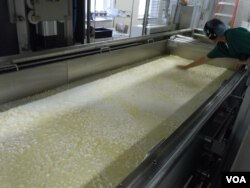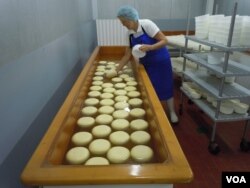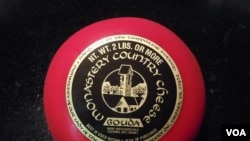CROZET, VIRGINIA —
Every day, at Our Lady of the Angels Monastery in the foothills of Virginia's Blue Ridge Mountains, the 13 resident nuns gather for prayer.
Theirs is a simple Christian life of worship and meditation.
The sisters also follow the Benedictine tradition of combining prayer with work. For the past 20 years, they've made their own version of Gouda, the flavorful cheese which originated in the Netherlands.
Sister Barbara Smickel, who co-founded the monastery 25 years ago, says that while it is not the most important part of their life, work is still very important.
"I just think working for a living is a good thing…our life is pretty intense; there’s a lot of silence, a lot of prayer, a lot of meditation in it and I think the balance of using our bodies in a healthy way is very important for that,” she says. "We use our bodies and the gifts God has given us of mind and heart and body to support ourselves and we find a special satisfaction in making a wholesome product to do that.”
Making Gouda
They support themselves by making the Dutch-style Gouda, which they produce in a cheese barn just down the hill from the monastery.
It's an enterprise they inherited from the farm’s previous owner.
The nuns start the cheese-making process with a truckful of warmed, pasteurized milk - more than 6,000 pounds [2,700 liters] - that’s piped into a giant stainless steel vat.
Cheese cook Sister Maria Gonzalo-Garcia adds a starter culture, which helps speed the process of turning the milk into cheese.
Mechanical paddles churn the mixture, and after half an hour, Sister Maria adds a synthetic rennet enzyme, which separates the milk into solids and liquid, known as curds and whey.
Magical moment
Sister Barbara refers to this as the magic time.
“Because it either sets up and turns into cheese, or it doesn’t," she says. "This is the time that we pray that it does happen. Now it’s up to the Lord to turn it into cheese.”
Today, the magic works and the cheese mixture is pumped into a giant vat where it's pressed into a solid block.
At this point, a machine could take over but the nuns prefer to do everything by hand. They separate, weigh and pack the cheese into special plastic bowls called hoops, for a final pressing.
It is very much a community effort, where all 13 of the sisters are involved in the process.
Sister Barbara recalls seeing a video once of a big cheese-making factory in Holland, where everything was computerized.
“My comment was, ‘Poor little cheese, never touched by human hands,’ so ours is, all day long, touched by human hands,” she says. “I think what makes our cheese special is the fact that part of our tradition is to do whatever you do as well as you can, whether it’s sweeping a floor or cooking the dinner or feeding the dog, or gardening or making cheese.”
Going to market
After their final pressing, the 2-pound [1-kilogram] wheels of buttery yellow cheese are soaked in salty water, cured in a refrigeration room and dipped in a special red wax before being shipped to customers across the United States.
The nuns expect to sell about 10,000 wheels of their hand-made Monastery Gouda by Christmas.
Eric Gertner buys 300 to 400 wheels a year, to sell in his specialty food store in nearby Charlottesville.
“We carry the monastery Gouda because the story behind it is really so compelling,” he says. “We have right here in our backyard a cheese made in ages-old monastic tradition…and they’re doing this to support and sustain their spiritual practice, so it’s just such a beautiful story. And the cheese is delicious in and of itself.”
Most of the nuns' business is done by mail order but customers can also buy cheese directly from the monastery.
“I think people buy it because it’s good, but also because they feel a certain solidarity with our way of life and want to support it in the way they can,” Sister Barbara says. “We try to put a lot of love and prayer into the cheese. We say that’s the secret ingredient.”
Whether it's luck or the power of prayer, the sisters have never, in the more than 20 years of Monastery cheese-making, had a single bad batch.
Theirs is a simple Christian life of worship and meditation.
The sisters also follow the Benedictine tradition of combining prayer with work. For the past 20 years, they've made their own version of Gouda, the flavorful cheese which originated in the Netherlands.
Sister Barbara Smickel, who co-founded the monastery 25 years ago, says that while it is not the most important part of their life, work is still very important.
"I just think working for a living is a good thing…our life is pretty intense; there’s a lot of silence, a lot of prayer, a lot of meditation in it and I think the balance of using our bodies in a healthy way is very important for that,” she says. "We use our bodies and the gifts God has given us of mind and heart and body to support ourselves and we find a special satisfaction in making a wholesome product to do that.”
Making Gouda
They support themselves by making the Dutch-style Gouda, which they produce in a cheese barn just down the hill from the monastery.
It's an enterprise they inherited from the farm’s previous owner.
The nuns start the cheese-making process with a truckful of warmed, pasteurized milk - more than 6,000 pounds [2,700 liters] - that’s piped into a giant stainless steel vat.
Cheese cook Sister Maria Gonzalo-Garcia adds a starter culture, which helps speed the process of turning the milk into cheese.
Mechanical paddles churn the mixture, and after half an hour, Sister Maria adds a synthetic rennet enzyme, which separates the milk into solids and liquid, known as curds and whey.
Magical moment
Sister Barbara refers to this as the magic time.
“Because it either sets up and turns into cheese, or it doesn’t," she says. "This is the time that we pray that it does happen. Now it’s up to the Lord to turn it into cheese.”
Today, the magic works and the cheese mixture is pumped into a giant vat where it's pressed into a solid block.
At this point, a machine could take over but the nuns prefer to do everything by hand. They separate, weigh and pack the cheese into special plastic bowls called hoops, for a final pressing.
It is very much a community effort, where all 13 of the sisters are involved in the process.
Sister Barbara recalls seeing a video once of a big cheese-making factory in Holland, where everything was computerized.
“My comment was, ‘Poor little cheese, never touched by human hands,’ so ours is, all day long, touched by human hands,” she says. “I think what makes our cheese special is the fact that part of our tradition is to do whatever you do as well as you can, whether it’s sweeping a floor or cooking the dinner or feeding the dog, or gardening or making cheese.”
Going to market
After their final pressing, the 2-pound [1-kilogram] wheels of buttery yellow cheese are soaked in salty water, cured in a refrigeration room and dipped in a special red wax before being shipped to customers across the United States.
The nuns expect to sell about 10,000 wheels of their hand-made Monastery Gouda by Christmas.
Eric Gertner buys 300 to 400 wheels a year, to sell in his specialty food store in nearby Charlottesville.
“We carry the monastery Gouda because the story behind it is really so compelling,” he says. “We have right here in our backyard a cheese made in ages-old monastic tradition…and they’re doing this to support and sustain their spiritual practice, so it’s just such a beautiful story. And the cheese is delicious in and of itself.”
Most of the nuns' business is done by mail order but customers can also buy cheese directly from the monastery.
“I think people buy it because it’s good, but also because they feel a certain solidarity with our way of life and want to support it in the way they can,” Sister Barbara says. “We try to put a lot of love and prayer into the cheese. We say that’s the secret ingredient.”
Whether it's luck or the power of prayer, the sisters have never, in the more than 20 years of Monastery cheese-making, had a single bad batch.






